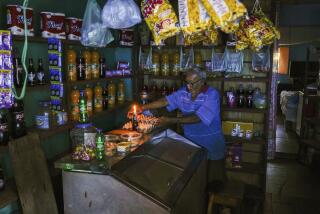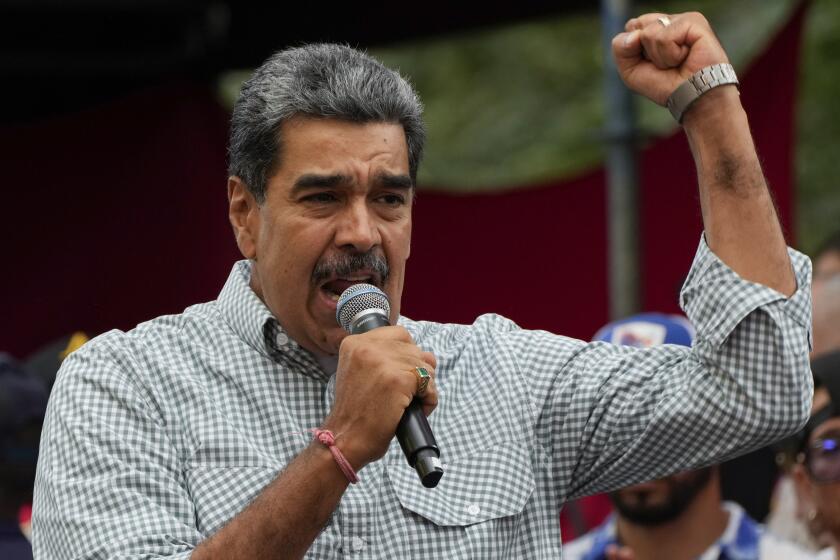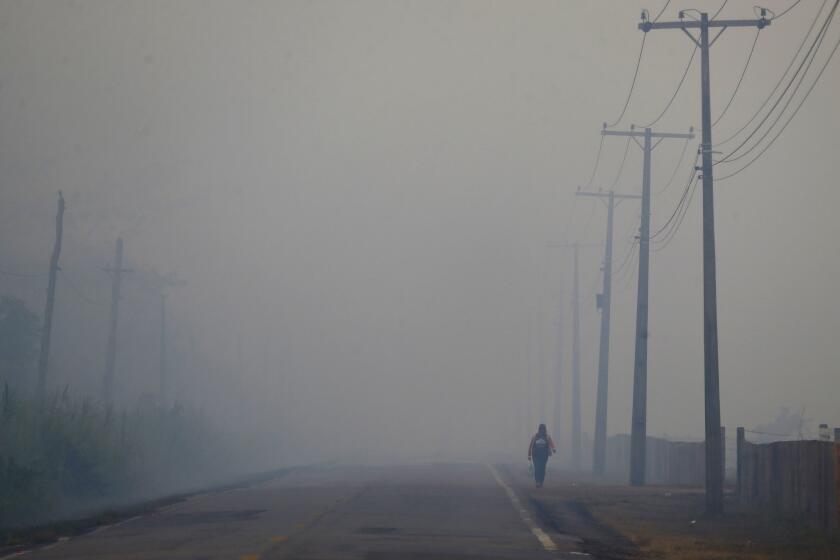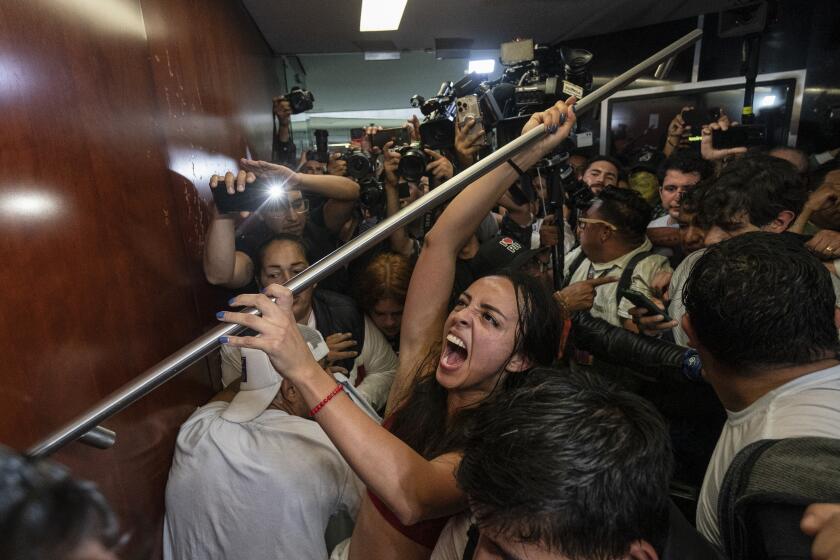Venezuela socialists’ defeat opens door to friendlier ties with U.S.
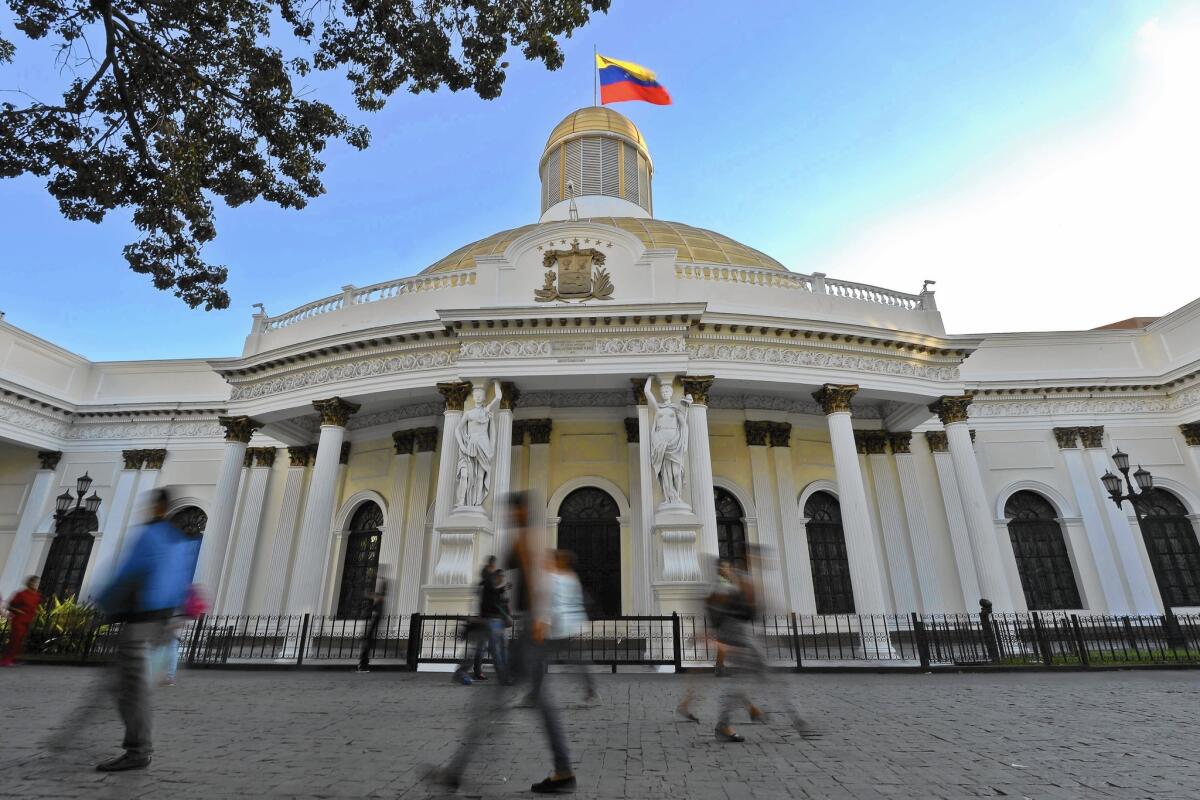
Opposition control of Venezuela’s National Assembly could give the U.S. a long-sought chance to make diplomatic inroads in the Latin nation.
When Venezuela’s leftist president, Nicolas Maduro, conceded his party’s landslide loss in legislative elections last weekend, he blamed an “economic war” against his oil-rich, cash-strapped nation.
That’s code for the United States, longtime enemy of the late strongman Hugo Chavez and the socialist government that has ruled Venezuela since 1999. Relations between Caracas and Washington are at an all-time low, with mutual recriminations and expulsions of diplomats.
But with the opposition winning control of the legislative branch — the first defeat for the socialist movement known as Chavismo — the Obama administration may have a long-sought chance to make diplomatic inroads in a nation that sits on the world’s largest proven oil reserves.
NEWSLETTER: Get the day’s top headlines from Times Editor Davan Maharaj >>
“All branches of government in Venezuela have been controlled by Chavismo,” said Cynthia Arnson, Latin America director for the Wilson Center think tank in Washington, “and now there is a crack in that facade.”
To take advantage of the opening, the administration will have to move carefully. Venezuela’s rulers have routinely cast the opposition as stooges of the U.S. government and other “reactionary” forces. Appearing too chummy with American officials would undermine opposition leaders as they finally gain some share of power.
“The idea that there would be other governing bodies that would be open to dialogue and to fostering dialogue would serve to improve relations,” Arnson said. “But the risk is that they will be tagged as a tool of the long arm of Uncle Sam.”
Much will depend on whether the two sides can work together.
The Democratic Unity Roundtable, a conservative opposition coalition, won 112 seats to 55 for the United Socialist Party of Venezuela, officials said Tuesday.
That gave the coalition the two-thirds majority it would need to challenge and potentially unseat Maduro.
Politicians in Venezuela have shown little inclination to cooperate. The country’s best-known opposition figure, Leopoldo Lopez, sits in prison after Maduro accused him of subversion and he was convicted of inciting political violence.
If Maduro remains in power, he could well push ahead with economic policies that have proved disastrous as well as much-criticized restrictions on freedom. A Maduro-controlled legislature gave the president unfettered power to rule by decree until the end of this year.
The question is whether the election results will further polarize Venezuelan politics or bring parties to the beginnings of an understanding, analysts say.
U.S. officials see a glimmer of hope, although they remain cautious.
“I think it’s too soon for us to say that there’s going to be major muscle movement changes here in the way we’re going to try to engage with Venezuela,” said John Kirby, a State Department spokesman. “In fact, what the results reinforce for us is the importance of continuing to have a dialogue with Venezuela, and to continue to try to get the relationship on a better path.”
Economic mismanagement and the slump in oil prices have handed Venezuela one of the highest inflation rates in the world and shortages of rice, oil, flour and basic consumer goods such as toilet paper.
An average monthly wage is equivalent to $15, and the country risks defaulting on its foreign debt next year. Widening malaise has fueled soaring crime, with Caracas now having one of the highest homicide rates in the world.
The bleak reality has overshadowed the gains that socialist rule initially brought Venezuela, including a reduction in poverty and broadening of educational opportunities. The discontent stoked the protest vote Sunday.
“The electoral victory doesn’t mean everything will get better — the lack of security, the food scarcities and so forth. It’s still the same government, still the same reality,” said Carlos Ponce, head of the Latin America program at Freedom House, a nonpartisan watchdog organization in Washington. “But a strengthened opposition could create new space in which more [ideas] fit … and a less belligerent attitude toward the U.S. could emerge.”
Before his death in 2013, Chavez provided friendly nations with cheap oil, encouraging them to embrace his leftist politics and stay silent about corruption and human rights abuses. Chavez, who was closely allied with the like-minded Castros of Cuba, inspired left-leaning governments to take hold in Argentina, Nicaragua, Ecuador, Bolivia and elsewhere.
Sunday’s electoral results may be part of a regionwide shift to the right as voters in several countries sour on their leaders, demand better living conditions and confront corruption, analysts said.
In Argentina last month, a center-right candidate upset President Cristina Fernandez de Kirchner’s anointed successor. Leftist Ecuadorean President Rafael Correa has said he will not seek reelection in 2017 after a decade in office. Brazilian President Dilma Rousseff is embroiled in scandals that may cost her job.
“It’s pretty clear that a long period of dominance by the left of various shades … is drawing to a close,” Michael Reid, an expert on Latin America, said at a recent forum.
Special correspondent Mery Mogollon in Caracas contributed to this report.
ALSO
A look at the K-1 visa that gave San Bernardino shooter entry into U.S.
North Face co-founder Douglas Tompkins dies in kayaking accident at 72
San Bernardino shooting: Attackers may have left bomb to kill police, used loan to buy arms
More to Read
Sign up for Essential California
The most important California stories and recommendations in your inbox every morning.
You may occasionally receive promotional content from the Los Angeles Times.


